Off-Page SEO : Everything you do outside of your website to raise its search engine rankings is referred to as “off-page SEO.” By engaging in these activities, search engines can better comprehend how users interact with your website. Developing a website’s feeling of authority, reliability, and relevance is the primary objective of off-page SEO.
What Is Off-Page SEO?
Search engine optimisation, or “off-page SEO,” describes initiatives taken to raise a website’s organic search engine ranks without modifying the website itself. Social media marketing, guest blogging, and link building are typical strategies.
Making your website appear more authoritative and trustworthy to search engines is the aim of off-page SEO.
It is a crucial component of an effective SEO plan.
Take note :
**Off-site SEO and off-page optimisation are other names for off-page SEO.
Why Is Off-Page SEO Important?
Consider off-page SEO as the establishment of your website’s credibility.
Additionally, off-page SEO elements like recommendations, reviews, and backlinks give search engines the impression that your website is reliable. It may result in increased exposure in search results.
Concentrating on Experience, Expertise, Authoritativeness, and Trustworthiness (E-E-A-T) is one of the best strategies to increase your credibility in the eyes of search engines. Google’s Quality Raters employ this notion while assessing search results and offering input to enhance upcoming algorithm improvements.
All of which indicates:
A key factor in your website’s ranking is off-page SEO.
On-Page SEO vs. Off-Page SEO
On-page SEO refers to efforts made on your webpages, whilst off-page SEO refers to optimisation strategies used off your website.
Here’s a brief rundown of the on-page and off-page SEO strategies:
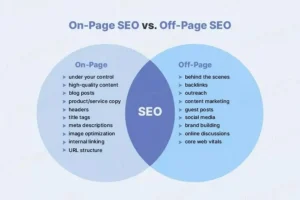
SEO is influenced by both on-page and off-page elements.
However, there’s also technical SEO to think about. This entails implementing technological enhancements to the entire website for things like security, loading times, and mobile friendliness. in an effort to increase search exposure.
5 Off-Page SEO Techniques That Work
Let’s examine five distinct off-page strategies that can increase the authority and organic (free) search traffic to your website:
1. Link Building
Getting other websites to link to your website is known as link building. These links are referred to as backlinks in SEO.
A website or domain may appear more authoritative to Google if it has more backlinks. particularly if those backlinks originate from other authoritative domains.
Couponsberg uses a metric known as the Authority Score to assess a website’s authority. It is determined by the quantity and quality of backlinks, the amount of organic traffic, and the overall naturalness of the backlink profile of the website.
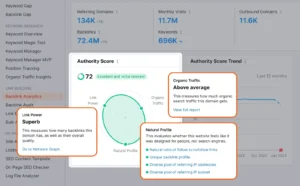
Domain Authority Score is the sixth best predictor of a webpage’s ranking position, according to our 2024 Ranking Factors study.
The remaining crucial off-page SEO KPIs, in order of importance, are:
- Page Authority Score: The particular page’s Authority Score
- A domain’s referrer IP count is the total number of distinct IP addresses that point to it.
- The total number of domains that connect to the domain is known as the number of referring domains (domain).
- Quantity of referring IPs (URL): The quantity of distinct IP addresses that connect to the webpage
- The quantity of distinct domains linking to the website is known as the number of referring domains (URL).
- Backlink count (domain): The overall count of backlinks pointing to the website
- Backlink count (URL): The overall count of backlinks pointing to the page
Our Backlink Analytics application allows you to collect these stats for nearly any website.
To obtain a thorough analysis similar to this one, simply input the domain and select “Analyse”:
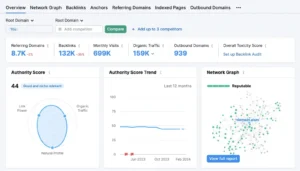
Are you eager to get fresh backlinks?
Let’s examine a few of the most well-liked link-building strategies:
Broken Link Building
Finding relevant backlinks that are broken and persuading their producers to update them with links to your website is the practice known as “broken link building.”
Suppose a trade journal pointed readers to a rival website that has subsequently been taken down.
To inform the newspaper that the link is broken, you could get in touch with them. and advise them to replace the resource link with a link to your version.
Using the Backlink Analytics tool is one of the finest ways to identify broken backlinks.
Simply input the domain of your choice or a rival. Next, use the “Broken Pages” filter under the “Indexed Pages” tab.
This will display URLs to you that are backlinked but not functioning properly.

Look for pages for which you have a suitable substitute.
Then, to view every backlink pointing to the URL, click the “Backlinks” number in the relevant row. You should definitely get in touch with these websites.
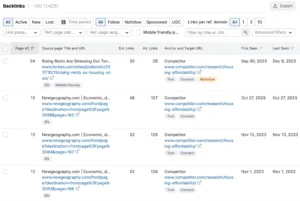
Unlinked Brand Mentions
Online references to your brand name that don’t contain a link are known as unlinked brand mentions (e.g., “Couponsberg” instead of “Couponsberg”).
If you ask politely enough, publishers will frequently include a link.
Using the Brand Monitoring app is the most convenient way to locate unlinked brand mentions.
Simply set up brand name monitoring (as well as any prevalent misspellings).
Next, search for mentions of you without backlinks in your “Mentions” report.
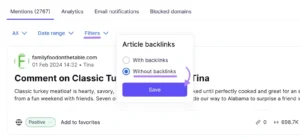
To optimise your chances of success, you can additionally select:
- Blogs and news websites (not social media or discussion sites)
- Remarks made within the previous 30 days
- Articles that are optimistic
After that, you may go through the results and select the websites you wish to get in touch with.
Journalist Requests
For their pieces, journalists frequently require expert opinion or additional marketing materials, such photos. They could be prepared to reciprocate with a connection to your website if you can meet those demands.
Journalist requests are available on websites such as Connectively.
or by keeping an eye on hashtags on X (formerly Twitter) like #JournoRequest.

2. Content Marketing
One crucial off-page SEO tactic is content marketing.
Putting out excellent content is a terrific method to demonstrate E-E-A-T, get media attention, and acquire backlinks.
Additionally, figuring out how to get that material via several platforms can help increase off-page signals.
Let’s examine some of the top channels for releasing your own content:
Digital PR
Nowadays, many SEOs prefer to use digital PR as their go-to link-building strategy because it entails leveraging PR tactics to obtain backlinks. It’s a fantastic method for obtaining quality backlinks quickly.
A successful PR effort might also
- Boost branded searches and brand awareness
- Present your company to the people that matter most to you.
- Increase traffic from referrals
- Display E-E-A-T
Learn the tried-and-true, step-by-step system developed by Brian Dean to elevate your PR tactics.
Social Media
Google rankings are not directly impacted by social media. However, it works wonders for drawing attention.
You’ll probably receive more traffic and links to that particular piece of content the more people share it on social media networks.
You’ll still attract more attention even if you don’t receive a link or any traffic right away. Moreover, greater attention generates more mentions and searches for a brand.
That benefits your off-page SEO in two ways.
Check out Couponsberg Social if you need assistance with your social media endeavours.
You can track your social media success, schedule content across numerous platforms, and do a lot more with this tool.
For more tips on enhancing your social media performance, see our guide on social media management.
Influencer Marketing
Collaborating with well-known bloggers and social media influencers to market your goods or services is known as influencer marketing.
It’s an amazing method to expand your audience, strengthen your brand, and produce content.
Large audiences follow influencers. It can assist in making sure you’re visible on pertinent platforms.
The Influencer Analytics app is a fast and effective approach to locate influencers.
For instance, as demonstrated above, we can look for YouTube influencers:
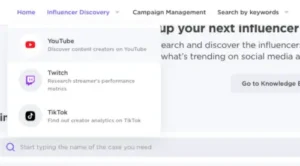
Sort influencers by price, category, amount of subscribers, and other criteria to identify those who might be most beneficial to your brand.
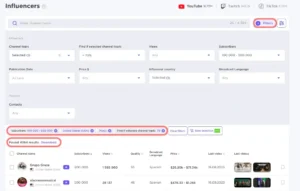
A list of results with filters will appear.
You can view the influencer’s engagement metrics by clicking on their photo. and, if it’s available to the public, a contact email.
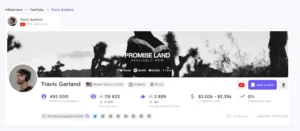
Guest Posting
Guest authoring can result in mentions and backlinks while exposing your business to a new audience.
And when done correctly, it can aid in connection building. All you have to do is make sure your attention is on publications that are pertinent to your area of expertise and that you are concentrating on offering truly helpful content.
Try using these search operators when using Google to identify guest blogging opportunities that are relevant to you:
- “your target keyword” plus “author of this guest post”
- “Your intended keyword” plus “This is a guest post”
- “Your goal term” combined with “guest column”
- “Your desired term” plus “guest post”
- “Your desired term” plus “contributing author”
- “your target keyword” plus “author who contributes”
This will display websites that have at least one guest author post.
They might approve your guest post if they have previously accepted guest posts. Additionally, they might let you add a link to your website in the donated article.
You could look for “affiliate marketing” plus “this is a guest contribution” if you’re writing about affiliate marketing, for instance.

Podcasts
These days, podcasts are very popular. And there are no indications that its popularity will decline.
You can be losing out on enormous chances if they aren’t a part of your marketing plan.
Why?
Podcasts are a terrific method to get a competitive edge because most firms are still not using them.
They also provide you the chance to share your knowledge, connect with new audiences, and get noticed on other websites.
Additionally, if you appear as a guest on a podcast, your website may be linked. Alternatively, if your website is appropriate, an external podcast may find it and cite it someplace in their description.
You can even get in touch with a podcast host and recommend that they include a link to your content in their show notes if you know what topics they typically cover.
Content Syndication
Republishing content on one or more websites is referred to as content syndication.
Because it’s simpler than constantly producing original content, some publications prefer to syndicate their content.
Additionally, it benefits you because it exposes your brand to a wider market.
A few well-known platforms for content syndication are as follows:
- In between
- Taboola
- Business 2
- Community
- Quiuu
- Outbrain
Additionally, you can look for websites in your niche and get in touch with them about content syndication.
However, carefully syndicate content.
In every given search, Google claims to “always show the version we think is most appropriate for users, which may or may not be the version you’d prefer.” In other words, an article’s version that was syndicated may score higher than the version that was posted on your website.
Make sure the syndicated version of the article links back to your original one to avoid it from happening. Additionally, set up your canonical tags correctly, which means that you should add some HTML code to your website so that it can indicate which version of a page is the main one.
Forums
It won’t improve your Google ranking to post links in forums for SEO.
However, you can participate in discussions pertaining to your area of expertise by using forums. to establish your authority and aid in your exposure to new audiences.
There aren’t many other venues that let you engage in direct conversation with prospective clients who are already inquiring about your offerings.
Thus, this is an excellent technique to start establishing rapport and trust. Additionally, you can provide pertinent content that community members have shown interest in if they’d like more information.
Two important large-scale platforms to use are Reddit and Quora. However, niche-specific forums can be just as useful.
Similar to, say, Google’s Search Central Help Community.
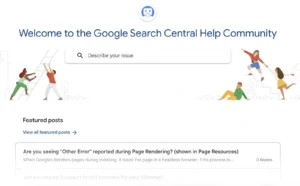
3. Local SEO
The practice of improving your internet presence to boost traffic, visibility, and brand awareness in the neighbourhood where your business is located is known as local SEO.
Let’s examine two off-page SEO strategies that local businesses ought to employ:
Google Business Profile Management
You may control how your business appears in Google by using the free Google Business Profile (GBP) tool for business listings.
And one of the most important off-page SEO strategies is to optimise your Google Business Profile, as that happens off of your website.
It’s actually a vital component of local SEO rankings.
Additionally, it can make your website more visible in highly visible places on Google’s search results pages.
Similar to the “plant store near me” map pack in our example:
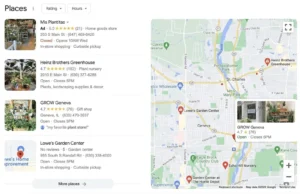
One of those companies’ Google Business Profiles looks like this:
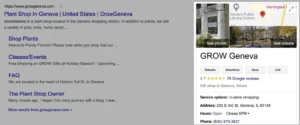
The following advice relates to Google Business Profiles:
- Take care when entering your contact details.
- Answer each review.
- Post content frequently, including images and videos.
Read our tutorial on Google Maps marketing to find out more about this topic.
NAP SEO
Getting your company’s accurate name, address, and phone number (NAP) included in web directories is known as NAP SEO.
These references are typically found in online reviews, social media accounts, and business directories. However, they may appear on a variety of webpages.
NAP citations are crucial since Google uses them to verify the accuracy of all the information about your company.
Thus, consistency is one of the keys to success when using citations. Both users and search engines find it perplexing when citations are inconsistent.
Making ensuring all of your NAP references match requires time.
Using our Listing Management tool is also a fast way to accomplish that.
To begin, type in the name of your company and select the search icon.
A dashboard summarising your entire online presence will be visible to you. Reviews, inaccurate listings, and more are included.
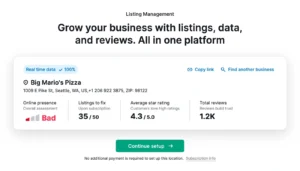
Here are some pointers for NAP citations:
- Ensure that all of your citations are consistent.
- Send your content to regional and specialised websites.
- Conduct NAP audits on a monthly basis.
4. Reviews
People may be convinced to trust your company via reviews.
In actuality, one of the most crucial elements Google considers when assessing the credibility of your website is reviews.
Additionally, they play a special role in local SEO.
Google advises responding to every review. Both positive and negative. By doing this, you demonstrate your appreciation for their business and input.
Review Management (a component of Listing Management) makes it easy to locate and respond to reviews swiftly.
Once the tool is configured, all of your reviews will be visible on a dashboard. Simply type your response in the tab and select “Reply” to respond.
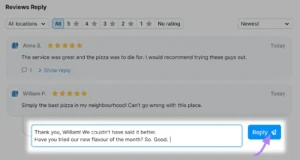
The following advice pertains to internet reviews:
- Please ask every client to provide a review.
- Respond to every review to establish credibility.
- Refrain from taking or offering payment in exchange for reviews.
5. Events
Events can help you by generating talk about your company in addition to engaging your audience.
For instance, when the event is being marketed on social media, you may receive brand mentions. Also on other websites in the event that participants produce post-event summaries.
In addition, referrals to your event landing page may come from interested parties, speakers, or influencers sharing it with their audiences.
Even though events might need more work to operate smoothly, it can be challenging to recreate the same energy in other contexts. They’re also an excellent means of obtaining outstanding press publicity.
See our guide on experiential marketing for more information.
Dive Into Off-Page SEO
If you’re unsure of where to begin with off-page SEO, think about developing links. which is easy to do with the tool for building links.
It looks for potential link builders (websites that could link to you) using the backlinks of your competitors and your goal keywords.
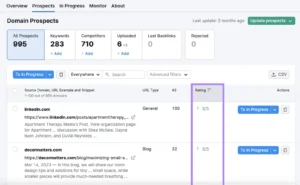
Choose your preferred link-building tactic (e.g., add link to article) when you identify a prospect.
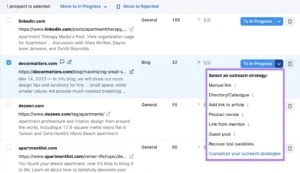
Then, to send your outreach email, select “Contact” under the “In Progress” option.
For the first time, you will need to link your email inbox.
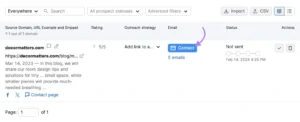
You might receive email address suggestions from the tool. If not, however, you can obtain the contact’s email address by following our recommendations.
You can keep track of whether your email has been delivered, read, or responded to after you send it.
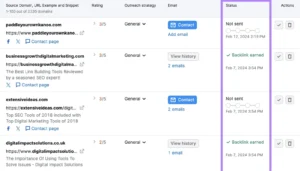
Are you looking for additional off-page SEO information? Some excellent advice is provided by our off-page SEO checklist.
**GET MORE INFORMATION VISIT ON …………Couponsberg.com
FAQs : Off-Page SEO
1. What is off-page SEO?
Off-page SEO refers to activities conducted outside your website to improve its search engine rankings. This includes building backlinks, social media engagement, influencer outreach, and more.
2. Why is off-page SEO important?
Off-page SEO is crucial because it helps establish your website’s authority, credibility, and relevance in the eyes of search engines. It also drives traffic, improves visibility, and can lead to higher search engine rankings.
3. What are backlinks, and why do they matter?
Backlinks are links from other websites to your site. They matter because search engines view them as endorsements of your content. High-quality backlinks from reputable sites can significantly boost your SEO.
4. How can social media affect off-page SEO?
While social media signals (likes, shares, comments) are not direct ranking factors, they can increase your content’s visibility and drive traffic to your site. Increased exposure can lead to more backlinks and brand mentions, which benefit off-page SEO.
5. What are some common off-page SEO strategies?
Common strategies include link building, guest blogging, influencer outreach, social media engagement, forum participation, content marketing, and managing online reviews.
6. How do I get high-quality backlinks?
You can get high-quality backlinks by creating valuable, shareable content, reaching out to relevant websites with personalized pitches, guest blogging, and building relationships with industry influencers and thought leaders.
7. How can I monitor my off-page SEO efforts?
Use tools like Google Search Console, Ahrefs, Moz, or SEMrush to track your backlinks, monitor brand mentions, and analyze your overall off-page SEO performance. Regularly review and adjust your strategies based on the insights these tools provide.
